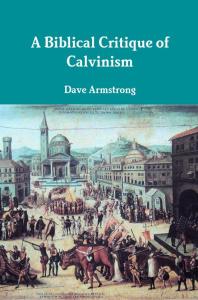
Lucas Banzoli is a very active Brazilian anti-Catholic polemicist, who holds to basically a Seventh-Day Adventist theology, whereby there is no such thing as a soul that consciously exists outside of a body, and no hell (soul sleep and annihilationism). This leads him to a Christology which is deficient and heterodox in terms of Christ’s human nature after His death. He has a Master’s degree in theology, a degree and postgraduate work in history, a license in letters, and is a history teacher, author of 25 books, as well as blogmaster (but now inactive) for six blogs. He’s active on YouTube.
***
The words of Lucas Banzoli will be in blue. I used Google Translate to transfer his Portugese text into English.
*****
This is a reply to Lucas’ article, “A Sola Fide na Bíblia (Justificação somente pela fé)” [Sola Fide in the Bible (Justification by Faith Alone] (1-7-14). All Bible passages: RSV.
His article consists solely of Bible passages. It reminds me a lot of my many articles like that, as well as two of my books consisting of almost solely Scripture. So I’m more than happy to “play along” with this sort of methodology. “Two can play at this game!” and (surprise!) Catholics can play it as well (and even better!) than Protestants. Lucas provided 45 proofs of “justification by faith alone” from Scripture, which really aren’t proofs at all, as I will show. To counter his presentation, I produce 200 categorized Bible passages in favor of the Catholic view of infused justification or justification by faith as evidenced or manifested in works: without which faith is dead. I will categorize Lucas’ 45 passages below according to my replies to them from a Catholic perspective. I also categorize (for ease of access) my “response passages” below.
Justification by Faith / Belief Without Denying the Place of Good Works in the Overall Equation
John 5:24 Truly, truly, I say to you, he who hears my word and believes him who sent me, has eternal life; he does not come into judgment, but has passed from death to life.
John 6:40 For this is the will of my Father, that every one who sees the Son and believes in him should have eternal life; and I will raise him up at the last day.”
John 6:47 Truly, truly, I say to you, he who believes has eternal life.
Romans 3:26 it was to prove at the present time that he himself is righteous and that he justifies him who has faith in Jesus.
Romans 3:30 [Lucas also separately and wrongly lists Romans 3:13 for this passage] since God is one; and he will justify the circumcised on the ground of their faith and the uncircumcised through their faith.
Romans 4:16 That is why it depends on faith, in order that the promise may rest on grace and be guaranteed to all his descendants — not only to the adherents of the law but also to those who share the faith of Abraham, for he is the father of us all,
Romans 5:1-2 Therefore, since we are justified by faith, we have peace with God through our Lord Jesus Christ. [2] Through him we have obtained access to this grace in which we stand, and we rejoice in our hope of sharing the glory of God.
Romans 5:9 Since, therefore, we are now justified by his blood, much more shall we be saved by him from the wrath of God.
Galatians 3:8 And the scripture, foreseeing that God would justify the Gentiles by faith, preached the gospel beforehand to Abraham, saying, “In you shall all the nations be blessed.”
2 Timothy 3:15 and how from childhood you have been acquainted with the sacred writings which are able to instruct you for salvation through faith in Christ Jesus.
Hebrew 4:3 [incorrectly listed as Heb 3:4] For we who have believed enter that rest, as he has said, “As I swore in my wrath, `They shall never enter my rest,'” although his works were finished from the foundation of the world.
Hebrews 10:38 but my righteous one shall live by faith, and if he shrinks back, my soul has no pleasure in him.”
Hebrews 10:39 But we are not of those who shrink back and are destroyed, but of those who have faith and keep their souls.
This is a matter of simple logic. The Protestant claim is “justification by faith alone”. But the phrases “justification by faith” or “believe [in Christ]” are not the same as that (though they are possibly consistent with the claim). “Alone” is an additional clause modifying [justifying] “faith” or “belief”. It excludes any additional element alongside of the faith. To use an analogy, I could say:
“I am justified by reading my Bible.”
That’s different from:
“I am justified by reading my Bible at midnight.”
The second is far more particular, and excludes all times besides midnight.
None of the above passages exclude good works or merit or sanctification as part of justification and salvation. We have to examine passages along those lines in order to have the complete picture. And I will do that below. But the passages above considered by themselves do not prove justification by faith alone.
Initial Justification
Romans 4:3-4, 7 [Lucas listed “Romans 4:1-7”, but had already included Rom 4:2, 5-6] For what does the scripture say? “Abraham believed God, and it was reckoned to him as righteousness.” [4] Now to one who works, his wages are not reckoned as a gift but as his due. . . . [7] “Blessed are those whose iniquities are forgiven, and whose sins are covered;
Romans 4:5 And to one who does not work but trusts him who justifies the ungodly, his faith is reckoned as righteousness.
Romans 4:6 So also David pronounces a blessing upon the man to whom God reckons righteousness apart from works:
Romans 4:9 Is this blessing pronounced only upon the circumcised, or also upon the uncircumcised? We say that faith was reckoned to Abraham as righteousness.
Romans 4:11-12 [Lucas had this listed as Rom 4:11-13, but he listed Romans 4:13 already] He received circumcision as a sign or seal of the righteousness which he had by faith while he was still uncircumcised. The purpose was to make him the father of all who believe without being circumcised and who thus have righteousness reckoned to them, [12] and likewise the father of the circumcised who are not merely circumcised but also follow the example of the faith which our father Abraham had before he was circumcised.
Romans 4:22-24 That is why his faith was “reckoned to him as righteousness.” [23] But the words, “it was reckoned to him,” were written not for his sake alone, [24] but for ours also. It will be reckoned to us who believe in him that raised from the dead Jesus our Lord,
Romans 10:9-10 because, if you confess with your lips that Jesus is Lord and believe in your heart that God raised him from the dead, you will be saved. [10] For man believes with his heart and so is justified, and he confesses with his lips and so is saved.
Galatians 3:6 Thus Abraham “believed God, and it was reckoned to him as righteousness.”
Galatians 3:22 Now it is evident that no man is justified before God by the law; for “He who through faith is righteous shall live”;
Hebrews 11:7 By faith Noah, being warned by God concerning events as yet unseen, took heed and constructed an ark for the saving of his household; by this he condemned the world and became an heir of the righteousness which comes by faith.
James 2:23 and the scripture was fulfilled which says, “Abraham believed God, and it was reckoned to him as righteousness”; and he was called the friend of God.
Catholics and Protestants agree with regard to the earliest, initial stage of justification. It comes by grace through faith (for those above the age of reason, able to exercise faith with understanding), and not works. We can do nothing to earn it. When Catholics talk about works being included in the whole process of salvation, that is referring to the time subsequent to initial justification.
Chapters 5 and 8 of the Decree on Justification, from the Council of Trent (1547) state:
V. On the necessity, in adults, of preparation for Justification, and whence it proceeds.
The Synod furthermore declares, that in adults, the beginning of the said Justification is to be derived from the prevenient grace of God, through Jesus Christ, that is to say, from His vocation, whereby, without any merits existing on their parts, they are called; that so they, who by sins were alienated from God, may be disposed through His quickening and assisting grace, to convert themselves to their own justification, by freely assenting to and co-operating with that said grace: in such sort that, while God touches the heart of man by the illumination of the Holy Ghost, neither is man himself utterly without doing anything while he receives that inspiration, forasmuch as he is also able to reject it; yet is he not able, by his own free will, without the grace of God, to move himself unto justice in His sight. Whence, when it is said in the sacred writings: Turn ye to me, and I will turn to you, we are admonished of our liberty; and when we answer; Convert us, O Lord, to thee, and we shall be converted, we confess that we are prevented by the grace of God.
VIII. In what manner it is to be understood, that the impious is justified by faith, and gratuitously.
And whereas the Apostle saith, that man is justified by faith and freely, those words are to be understood in that sense which the perpetual consent of the Catholic Church hath held and expressed; to wit, that we are therefore said to be justified by faith, because faith is the beginning of human salvation, the foundation, and the root of all Justification; without which it is impossible to please God, and to come unto the fellowship of His sons: but we are therefore said to be justified freely, because that none of those things which precede justification-whether faith or works-merit the grace itself of justification. For, if it be a grace, it is not now by works, otherwise, as the same Apostle says, grace is no more grace.
Chapter 10 refers to “that justice which they have received through the grace of Christ”. See also:
CANON III.-If any one saith, that without the prevenient inspiration of the Holy Ghost, and without his help, man can believe, hope, love, or be penitent as he ought, so as that the grace of Justification may be bestowed upon him; let him be anathema.
Likewise, the Catholic Catechism (#1989) states:
The first work of the grace of the Holy Spirit is conversion, effecting justification in accordance with Jesus’ proclamation at the beginning of the Gospel: “Repent, for the kingdom of heaven is at hand.” Moved by grace, man turns toward God and away from sin, thus accepting forgiveness and righteousness from on high. . . .
See my related articles: Initial Justification & “Faith Alone”: Harmonious? [5-3-04] and Monergism in Initial Justification is Catholic Doctrine [1-7-10], and another hosted on my page: Trent Doesn’t Utterly Exclude Imputation (Kenneth Howell) [July 1996].
The above passages, understood in this light, do not contradict Catholic teaching at all, nor do they prove justification by faith alone.
Justification by Grace Alone / Rejection of Salvation by Works (Pelagianism)
Ephesians 2:8-9 For by grace you have been saved through faith; and this is not your own doing, it is the gift of God — [9] not because of works, lest any man should boast.
Romans 3:22-24 the righteousness of God through faith in Jesus Christ for all who believe. For there is no distinction; [23] since all have sinned and fall short of the glory of God, [24] they are justified by his grace as a gift, through the redemption which is in Christ Jesus,
Romans 11:6 But if it is by grace, it is no longer on the basis of works; otherwise grace would no longer be grace.
2 Corinthians 3:5 Not that we are competent of ourselves to claim anything as coming from us; our competence is from God,
Ephesians 1:7 In him we have redemption through his blood, the forgiveness of our trespasses, according to the riches of his grace
Ephesians 2:5 even when we were dead through our trespasses, made us alive together with Christ (by grace you have been saved),
2 Timothy 1:9 who saved us and called us with a holy calling, not in virtue of our works but in virtue of his own purpose and the grace which he gave us in Christ Jesus ages ago,
Titus 3:4-7 but when the goodness and loving kindness of God our Savior appeared, [5] he saved us, not because of deeds done by us in righteousness, but in virtue of his own mercy, by the washing of regeneration and renewal in the Holy Spirit, [6] which he poured out upon us richly through Jesus Christ our Savior, [7] so that we might be justified by his grace and become heirs in hope of eternal life.
These are similar to the preceding set of passages, and neither refute Catholic soteriology nor prove “faith alone”. Catholics fully agree with Protestants that salvation is by grace alone: which is different from faith alone, since grace comes solely from God, while faith comes from man’s free will choice, preceded and ultimately caused by the grace of God. The Council of Trent (Decrees and Canons on Justification) confirms this, too:
CANON I.-If any one saith, that man may be justified before God by his own works, whether done through the teaching of human nature, or that of the law, without the grace of God through Jesus Christ; let him be anathema.
CANON II.-If any one saith, that the grace of God, through Jesus Christ, is given only for this, that man may be able more easily to live justly, and to merit eternal life, as if, by free will without grace, he were able to do both, though hardly indeed and with difficulty; let him be anathema.
The Catholic Catechism also states:
1996 Our justification comes from the grace of God. Grace is favor, the free and undeserved help that God gives us to respond to his call to become children of God, adoptive sons, partakers of the divine nature and of eternal life.
1998 This vocation to eternal life is supernatural. It depends entirely on God’s gratuitous initiative, for he alone can reveal and give himself. It surpasses the power of human intellect and will, as that of every other creature.
1999 The grace of Christ is the gratuitous gift that God makes to us of his own life, infused by the Holy Spirit into our soul to heal it of sin and to sanctify it. . . .
2001 The preparation of man for the reception of grace is already a work of grace. This latter is needed to arouse and sustain our collaboration in justification through faith, and in sanctification through charity. God brings to completion in us what he has begun, . . .
2008 The merit of man before God in the Christian life arises from the fact that God has freely chosen to associate man with the work of his grace. The fatherly action of God is first on his own initiative, and then follows man’s free acting through his collaboration, so that the merit of good works is to be attributed in the first place to the grace of God, then to the faithful. Man’s merit, moreover, itself is due to God, for his good actions proceed in Christ, from the predispositions and assistance given by the Holy Spirit.
2009 Filial adoption, in making us partakers by grace in the divine nature, can bestow true merit on us as a result of God’s gratuitous justice. . . .
2011 The charity of Christ is the source in us of all our merits before God. Grace, by uniting us to Christ in active love, ensures the supernatural quality of our acts and consequently their merit before God and before men. The saints have always had a lively awareness that their merits were pure grace. . . .
2017 The grace of the Holy Spirit confers upon us the righteousness of God. Uniting us by faith and Baptism to the Passion and Resurrection of Christ, the Spirit makes us sharers in his life.
2020 Justification has been merited for us by the Passion of Christ. It is granted us through Baptism. It conforms us to the righteousness of God, who justifies us. It has for its goal the glory of God and of Christ, and the gift of eternal life. It is the most excellent work of God’s mercy.
2022 The divine initiative in the work of grace precedes, prepares, and elicits the free response of man. Grace responds to the deepest yearnings of human freedom, calls freedom to cooperate with it, and perfects freedom.
2023 Sanctifying grace is the gratuitous gift of his life that God makes to us; it is infused by the Holy Spirit into the soul to heal it of sin and to sanctify it.
2027 No one can merit the initial grace which is at the origin of conversion. . . .
1266 The Most Holy Trinity gives the baptized sanctifying grace, the grace of justification:
– enabling them to believe in God, to hope in him, and to love him through the theological virtues; . . .
1250 . . . The sheer gratuitousness of the grace of salvation is particularly manifest in infant Baptism. . . .
1727 The beatitude of eternal life is a gratuitous gift of God. It is supernatural, as is the grace that leads us there.
Good works and merit proceed wholly from the grace of God (#2008 above) through the work of Jesus Christ on our behalf (not from ourselves). They are necessary but they do not earn salvation, which is by grace alone: Decree on Justification: chapter 16; Canons 18, 19, 20, 24, 26, 32, 33. Canon 32 refers to “the good works which he performs through the grace of God and the merit of Jesus Christ”.
See also my articles: Grace Alone: Perfectly Acceptable Catholic Teaching [2-3-09], Salvation: By Grace Alone, Not Faith Alone or Works [2013], Grace Alone: Biblical & Catholic Teaching [12-1-15]
Many Protestants can’t grasp this because they are in bondage to “either/or” unbiblical thinking. If man does anything, in the “either/or” mentality, God does nothing, and it is works-salvation. It’s all or nothing. God must do all. The problem is that the Bible says many times that we do do things: in and under God’s grace. It doesn’t dichotomize men’s actions and God’s grace, as men do, following the traditions of men. The Bible systematically supports Catholic positions.
Justification by Faith Rather than Law
Romans 3:11 Now it is evident that no man is justified before God by the law; for “He who through faith is righteous shall live”;
Romans 4:13 The promise to Abraham and his descendants, that they should inherit the world, did not come through the law but through the righteousness of faith.
Romans 9:30-32 What shall we say, then? That Gentiles who did not pursue righteousness have attained it, that is, righteousness through faith; [31] but that Israel who pursued the righteousness which is based on law did not succeed in fulfilling that law. [32] Why? Because they did not pursue it through faith, but as if it were based on works. They have stumbled over the stumbling stone,
Galatians 3:24 So that the law was our custodian until Christ came, that we might be justified by faith.
Philippians 3:9 [incorrectly listed as 2:9] and be found in him, not having a righteousness of my own, based on law, but that which is through faith in Christ, the righteousness from God that depends on faith;
These passages are a variation of the theme of the previous two sections. Catholics and Protestants agree that the Law in and of itself doesn’t save. It’s grace and a grace-enabled faith that saves. So far, there is total agreement, and these passages don’t prove faith alone, either. Man then cooperates with this grace to do meritorious good works leading to salvation (see the previous section).
Includes Works in the Passage
John 6:28-29 Then they said to him, “What must we do, to be doing the works of God?” [29] Jesus answered them, “This is the work of God, that you believe in him whom he has sent.”
Romans 1:17 For in it the righteousness of God is revealed through faith for faith; as it is written, “He who through faith is righteous shall live.”
Romans 4:2 For if Abraham was justified by works, he has something to boast about, but not before God.
Hebrews 11:4 By faith Abel offered to God a more acceptable sacrifice than Cain, through which he received approval as righteous, God bearing witness by accepting his gifts; he died, but through his faith he is still speaking.
These express the Catholic view of faith necessarily including works and justification and sanctification working together (infused justification). Notice how in Romans 1:17 one must be “righteous” to live (attain salvation); not merely have faith. Abraham was “justified by works” but it was not works-salvation, which is why he had no grounds to “boast.” His salvation came by grace through faith, just as everyone else’s did. But it didn’t exclude works in the process. Abel’s faith was expressed by a good work: making “a more acceptable sacrifice than Cain”: bringing about God’s “approval”.
In John 6:28-29, working and belief in Christ are equated, much like obedience and belief in John 3:36. In the marvelous phrase “doing the works of God,” we see that our works and God’s are intertwined if indeed we are doing his will. This is the Catholic viewpoint: an organic connection of both faith with works, and God’s unmerited grace coupled with our cooperation and obedience. Our Lord constantly alludes to the related ideas of reward and merit, which are complementary: Matthew 5:11-12, 6:3, 18, 10:42, 12:36-37, 25:14-30; Luke 6:35, 38; 12:33. St. Paul, using the same word for “works” (ergon), speaks in Acts 26:20 of the process of repenting, turning to God, and doing deeds worthy of their repentance. In other words, they will thus prove their repentance by their deeds.
“Works of the Law”
Romans 3:27-28 [27] Then what becomes of our boasting? It is excluded. On what principle? On the principle of works? No, but on the principle of faith. [28] For we hold that a man is justified by faith apart from works of law.
Galatians 2:16 yet who know that a man is not justified by works of the law but through faith in Jesus Christ, even we have believed in Christ Jesus, in order to be justified by faith in Christ, and not by works of the law, because by works of the law shall no one be justified.
Protestants habitually use these passages (and others that mention “works of the law”: Rom 3:20; Gal 3:2, 5, 10) to contend that works are antithetical to faith and grace. But “works of the law” has a particular meaning beyond simply “good works” or “all works”. This understanding has been affirmed by a Protestant movement of Pauline studies called the “New Perspective on Paul.” Anglican Bishop and professor of theology N. T. Wright (born 1948) is the most well-known proponent of it. The Wikipedia article explains:
Paul’s letters contain a substantial amount of criticism regarding the “works of the Law“. The radical difference in these two interpretations of what Paul meant by “works of the Law” is the most consistent distinguishing feature between the two perspectives. The historic Protestant perspectives interpret this phrase as referring to human effort to do good works in order to meet God’s standards (Works Righteousness). In this view, Paul is arguing against the idea that humans can merit salvation from God by their good works alone (note that the “new” perspective agrees that we cannot merit salvation; the issue is what exactly Paul is addressing).
By contrast, new-perspective scholars see Paul as talking about “badges of covenant membership” or criticizing Gentile believers who had begun to rely on the Torah to reckon Jewish kinship. It is argued that in Paul’s time, Israelites were being faced with a choice of whether to continue to follow their ancestral customs, the Torah, or to follow the Roman Empire’s trend to adopt Greek customs (Hellenization, see also Antinomianism, Hellenistic Judaism, and Circumcision controversy in early Christianity). The new-perspective view is that Paul’s writings discuss the comparative merits of following ancient Israelite or ancient Greek customs. Paul is interpreted as being critical of a common Jewish view that following traditional Israelite customs makes a person better off before God, pointing out that Abraham was righteous before the Torah was given. Paul identifies customs he is concerned about as circumcision, dietary laws, and observance of special days.
Due to their interpretation of the phrase “works of the law,” theologians of the historic Protestant perspectives see Paul’s rhetoric as being against human effort to earn righteousness. This is often cited by Protestant and Reformed theologians as a central feature of the Christian religion, and the concepts of grace alone and faith alone are of great importance within the creeds of these denominations.
“New-perspective” interpretations of Paul tend to result in Paul having nothing negative to say about the idea of human effort or good works, and saying many positive things about both. New-perspective scholars point to the many statements in Paul’s writings that specify the criteria of final judgment as being the works of the individual.
Viewed in this light, the passages above and related ones are not contrary at all to Catholic teaching, but are contrary to historic Protestant use of these passages to imply that the Apostle Paul was against all human works whatever. Many other passages (which I will soon cite) prove that he wasn’t against them at all, and indeed commanded them and attached them to sanctification, justification, and salvation alike.
Baptismal Regeneration
Mark 16:16 He who believes and is baptized will be saved; but he who does not believe will be condemned.
This is obviously not “faith alone” because it entails a “work” or ritual of baptism, leading to initial justification and salvation (which can be lost if a person doesn’t persevere in the faith by grace).
No Relation to Justification or Salvation
Matthew 9:22 Jesus turned, and seeing her he said, “Take heart, daughter; your faith has made you well.” And instantly the woman was made well.
I don’t know why Lucas includes this, since it has nothing to do with soteriology. It has to do with faith leading to healing: concerning which Catholics and Protestants agree: except for largely Reformed Protestant “cessationists” who think that God no longer performs miracles today.
***
I conclude from all this that Lucas’ 45 passages [really 40: closely examined] supposedly proving justification / salvation by “faith alone” do no such thing. They do not prove that false doctrine at all. And the many biblical passages I will produce now, contradict it and expressly support the Catholic position.
Final Judgment in Scripture is Always Associated with Works and Never with Faith Alone (50 Passages)
Protestant evangelicals, when evangelizing, typically ask the inquisitive and provocative question: “If you were to die tonight and God asked you why He should let you into heaven, what would you tell Him?” They assume the proper answer is that they exercised “faith in Christ alone.” First of all, I’ve never seen in the Bible an example of God ever acting like this; so this is simply one of many Protestant catch-phrases or slogans or evangelistic techniques which cannot be found in the Bible (as far as that goes).
At the Final Judgment God doesn’t wrangle with people (and people don’t argue with God — just as with any earthly judge); He simply declares judgment, which is precisely what happens in Matthew 25. He doesn’t ask them questions about their eschatological fate in heaven or hell. As far as we know from revelation, God doesn’t talk in the manner that the familiar evangelical slogans and lingo would have Him talk (as if that were a likely or biblically supported scenario).
I find it extremely interesting that in the passages that Protestants typically cite concerning judgment (Matthew 25:31, 41-46 and Rev elation 20:11-15), we hear not a single word about the “faith alone” which is all that they seem to ever talk about in the context of judgment. Why is this, if in fact, faith alone were the sole criterion of salvation or damnation? Wouldn’t that seem to be, prima facie, a bit strange and unexpected from an evangelical viewpoint?
Instead, all we find in the Bible is this useless talk about works having something to do with salvation! Doesn’t Jesus know that works have no connection to faith whatsoever, and that sanctification and justification are entirely separated in good, orthodox evangelical or Calvinist theology? Jesus would clearly have failed the soteriology (salvation theology) class in any of their seminaries.
Maybe our Lord Jesus attended a liberal synagogue, influenced by heretical Romish ideas. Why does Jesus keep talking about feeding the hungry, giving water to the thirsty, inviting in strangers, clothing the naked, visiting prisoners, and being judged “according to their deeds”? What in the world do all these “works” have to do with salvation? Why doesn’t Jesus talk about faith alone??!! Something is seriously wrong here. Jesus — and Paul — just don’t get it.
Here are 50 biblical passages about judgment where works are mentioned as the criterion of salvation but not faith alone. One of them at least mentions faith in the context of judgment (but alas, not faith alone): Revelation 21:8 includes the “faithless” among those who will be damned for eternity. Even there it is surrounded by many bad works that characterize the reprobate person.
1 Samuel 28:16, 18 And Samuel said, “. . . the LORD has turned from you and become your enemy . . . [18] [b]ecause you did not obey the voice of the LORD, and did not carry out his fierce wrath against Am’alek . . .
2 Kings 22:13 (cf. 2 Chr 34:21) “. . . the wrath of the LORD that is kindled against us, because our fathers have not obeyed the words of this book, to do according to all that is written concerning us.”
Psalm 7:8-10 The LORD judges the peoples; judge me, O LORD, according to my righteousness and according to the integrity that is in me. O let the evil of the wicked come to an end, but establish thou the righteous, thou who triest the minds and hearts, thou righteous God. My shield is with God, who saves the upright in heart.
Psalm 58:11 Men will say, “Surely there is a reward for the righteous; surely there is a God who judges on earth.”
Ecclesiastes 12:14 For God will bring every deed into judgment, with every secret thing, whether good or evil.
Isaiah 59:18 According to their deeds, so will he repay, wrath to his adversaries, requital to his enemies; . . .
Jeremiah 4:4 (cf. 21:12) Circumcise yourselves to the LORD, remove the foreskin of your hearts, O men of Judah and inhabitants of Jerusalem; lest my wrath go forth like fire, and burn with none to quench it, because of the evil of your doings.”
Ezekiel 7:3 (cf. 7:8; 33:20) Now the end is upon you, and I will let loose my anger upon you, and will judge you according to your ways; and I will punish you for all your abominations.
Ezekiel 36:19 I scattered them among the nations, and they were dispersed through the countries; in accordance with their conduct and their deeds I judged them.
Micah 5:15 And in anger and wrath I will execute vengeance upon the nations that did not obey.
Zephaniah 2:3 Seek the LORD, all you humble of the land, who do his commands; seek righteousness, seek humility; perhaps you may be hidden on the day of the wrath of the LORD.
Matthew 5:22 But I say to you that every one who is angry with his brother shall be liable to judgment; whoever insults his brother shall be liable to the council, and whoever says, `You fool!’ shall be liable to the hell of fire.
Matthew 7:16-27 You will know them by their fruits. Are grapes gathered from thorns, or figs from thistles? So every sound tree bears good fruit; but the bad tree bears evil fruit. A sound tree cannot bear evil fruit, nor can a bad tree bear good fruit. Every tree that does not bear good fruit is cut down and thrown into the fire. Thus you will know them by their fruits. Not every one who says to me, “Lord, Lord,” shall enter the kingdom of heaven, but he who does the will of my Father who is in heaven. On that day many will say to me, “Lord, Lord, did we not prophesy in your name, and cast out demons in your name, and do many mighty works in your name?” And then will I declare to them, “I never knew you; depart from me, you evildoers.” Every one then who hears these words of mine, and does them will be like a wise man who built his house upon the rock; and the rain fell, and the floods came, and the winds blew and beat upon that house, but it did not fall, because it had been founded on the rock. And every one who hears these words of mine, and does not do them will be like a foolish man who built his house upon the sand; and the rain fell, and the floods came, and the winds blew and beat against that house, and it fell; and great was the fall of it.
Matthew 10:22 (cf. Mt 24:13; Mk 13:13) . . . But he who endures to the end will be saved.
Matthew 16:27 For the Son of man is to come with his angels in the glory of his Father, and then he will repay every man for what he has done.
Matthew 18:8-9 (cf. Mk 9:43; 9:47) And if your hand or your foot causes you to sin, cut it off and throw it away; it is better for you to enter life maimed or lame than with two hands or two feet to be thrown into the eternal fire. And if your eye causes you to sin, pluck it out and throw it away; it is better for you to enter life with one eye than with two eyes to be thrown into the hell of fire.
Matthew 25:14-30 “For it will be as when a man going on a journey called his servants and entrusted to them his property; to one he gave five talents, to another two, to another one, to each according to his ability. Then he went away. He who had received the five talents went at once and traded with them; and he made five talents more. So also, he who had the two talents made two talents more. But he who had received the one talent went and dug in the ground and hid his master’s money. Now after a long time the master of those servants came and settled accounts with them. And he who had received the five talents came forward, bringing five talents more, saying, ‘Master, you delivered to me five talents; here I have made five talents more.’ His master said to him, `Well done, good and faithful servant; you have been faithful over a little, I will set you over much; enter into the joy of your master.’ And he also who had the two talents came forward, saying, `Master, you delivered to me two talents; here I have made two talents more.’ His master said to him, `Well done, good and faithful servant; you have been faithful over a little, I will set you over much; enter into the joy of your master.’ He also who had received the one talent came forward, saying, `Master, I knew you to be a hard man, reaping where you did not sow, and gathering where you did not winnow; so I was afraid, and I went and hid your talent in the ground. Here you have what is yours.’ But his master answered him, `You wicked and slothful servant! You knew that I reap where I have not sowed, and gather where I have not winnowed? Then you ought to have invested my money with the bankers, and at my coming I should have received what was my own with interest. So take the talent from him, and give it to him who has the ten talents. For to every one who has will more be given, and he will have abundance; but from him who has not, even what he has will be taken away. And cast the worthless servant into the outer darkness; there men will weep and gnash their teeth.’
Matthew 25:31-46 “When the Son of man comes in his glory, and all the angels with him, then he will sit on his glorious throne. Before him will be gathered all the nations, and he will separate them one from another as a shepherd separates the sheep from the goats, and he will place the sheep at his right hand, but the goats at the left. Then the King will say to those at his right hand, `Come, O blessed of my Father, inherit the kingdom prepared for you from the foundation of the world; for I was hungry and you gave me food, I was thirsty and you gave me drink, I was a stranger and you welcomed me, I was naked and you clothed me, I was sick and you visited me, I was in prison and you came to me.’ Then the righteous will answer him, `Lord, when did we see thee hungry and feed thee, or thirsty and give thee drink? And when did we see thee a stranger and welcome thee, or naked and clothe thee? And when did we see thee sick or in prison and visit thee?’ And the King will answer them, `Truly, I say to you, as you did it to one of the least of these my brethren, you did it to me.’ Then he will say to those at his left hand, `Depart from me, you cursed, into the eternal fire prepared for the devil and his angels; for I was hungry and you gave me no food, I was thirsty and you gave me no drink, I was a stranger and you did not welcome me, naked and you did not clothe me, sick and in prison and you did not visit me.’ Then they also will answer, `Lord, when did we see thee hungry or thirsty or a stranger or naked or sick or in prison, and did not minister to thee?’ Then he will answer them, `Truly, I say to you, as you did it not to one of the least of these, you did it not to me.’ And they will go away into eternal punishment, but the righteous into eternal life.”
Luke 3:9 (+ Mt 3:10; 7:19) Even now the axe is laid to the root of the trees; every tree therefore that does not bear good fruit is cut down and thrown into the fire.
Luke 14:13-14 But when you give a feast, invite the poor, the maimed, the lame, the blind, and you will be blessed, because they cannot repay you. You will be repaid at the resurrection of the just.
Luke 21:34-36 “But take heed to yourselves lest your hearts be weighed down with dissipation and drunkenness and cares of this life, and that day come upon you suddenly like a snare; for it will come upon all who dwell upon the face of the whole earth. But watch at all times, praying that you may have strength to escape all these things that will take place, and to stand before the Son of man.
John 5:26-29 For as the Father has life in himself, so he has granted the Son also to have life in himself, and has given him authority to execute judgment, because he is the Son of man. Do not marvel at this; for the hour is coming when all who are in the tombs will hear his voice and come forth, those who have done good, to the resurrection of life, and those who have done evil, to the resurrection of judgment.
Romans 1:18 For the wrath of God is revealed from heaven against all ungodliness and wickedness of men who by their wickedness suppress the truth.
Romans 2:5-13 But by your hard and impenitent heart you are storing up wrath for yourself on the day of wrath when God’s righteous judgment will be revealed. For he will render to every man according to his works: To those who by patience in well-doing seek for glory and honour and immortality, he will give eternal life; but for those who are factious and do not obey the truth, but obey wickedness, there will be wrath and fury. There will be tribulation and distress for every human being who does evil, the Jew first and also the Greek, but glory and honour and peace for every one who does good, the Jew first and also the Greek. For God shows no partiality. All who have sinned without the law will also perish without the law, and all who have sinned under the law will be judged by the law. For it is not the hearers of the law who are righteous before God, but the doers of the law who will be justified.
1 Corinthians 3:8-9 He who plants and he who waters are equal, and each shall receive his wages according to his labor. For we are God’s fellow workers; you are God’s field, God’s building.
2 Corinthians 5:10 For we must all appear before the judgment seat of Christ, so that each one may receive good or evil, according to what he has done in the body.
1 Thessalonians 3:12-13 . . . may the Lord make you increase and abound in love to one another and to all men, as we do to you, so that he may establish your hearts unblamable in holiness before our God and Father, at the coming of our Lord Jesus with all his saints.
1 Thessalonians 5:23 May the God of peace himself sanctify you wholly; and may your spirit and soul and body be kept sound and blameless at the coming of our Lord Jesus Christ.
2 Thessalonians 1:7-12 . . . when the Lord Jesus is revealed from heaven with his mighty angels in flaming fire, inflicting vengeance upon those who do not know God and upon those who do not obey the gospel of our Lord Jesus. They shall suffer the punishment of eternal destruction and exclusion from the presence of the Lord and from the glory of his might, when he comes on that day to be glorified in his saints, and to be marveled at in all who have believed, because our testimony to you was believed. To this end we always pray for you, that our God may make you worthy of his call, and may fulfil every good resolve and work of faith by his power, so that the name of our Lord Jesus may be glorified in you, and you in him, according to the grace of our God and the Lord Jesus Christ.
Hebrews 6:7-8 For land which has drunk the rain that often falls upon it, and brings forth vegetation useful to those for whose sake it is cultivated, receives a blessing from God. But if it bears thorns and thistles, it is worthless and near to being cursed; its end is to be burned.
1 Peter 1:17 . . . who judges each one impartially according to his deeds . . .
1 Peter 4:13 (cf. Rom 8:17) But rejoice in so far as you share Christ’s sufferings, that you may also rejoice and be glad when his glory is revealed.
2 Peter 3:10-14 But the day of the Lord will come like a thief, and then the heavens will pass away with a loud noise, and the elements will be dissolved with fire, and the earth and the works that are upon it will be burned up. Since all these things are thus to be dissolved, what sort of persons ought you to be in lives of holiness and godliness, waiting for and hastening the coming of the day of God, because of which the heavens will be kindled and dissolved, and the elements will melt with fire! But according to his promise we wait for new heavens and a new earth in which righteousness dwells. Therefore, beloved, since you wait for these, be zealous to be found by him without spot or blemish, and at peace.
Jude 6-16 And the angels that did not keep their own position but left their proper dwelling have been kept by him in eternal chains in the nether gloom until the judgment of the great day; just as Sodom and Gomor’rah and the surrounding cities, which likewise acted immorally and indulged in unnatural lust, serve as an example by undergoing a punishment of eternal fire. Yet in like manner these men in their dreamings defile the flesh, reject authority, and revile the glorious ones. But when the archangel Michael, contending with the devil, disputed about the body of Moses, he did not presume to pronounce a reviling judgment upon him, but said, “The Lord rebuke you.” But these men revile whatever they do not understand, and by those things that they know by instinct as irrational animals do, they are destroyed. Woe to them! For they walk in the way of Cain, and abandon themselves for the sake of gain to Balaam’s error, and perish in Korah’s rebellion. These are blemishes on your love feasts, as they boldly carouse together, looking after themselves; waterless clouds, carried along by winds; fruitless trees in late autumn, twice dead, uprooted; wild waves of the sea, casting up the foam of their own shame; wandering stars for whom the nether gloom of darkness has been reserved for ever. It was of these also that Enoch in the seventh generation from Adam prophesied, saying, “Behold, the Lord came with his holy myriads, to execute judgment on all, and to convict all the ungodly of all their deeds of ungodliness which they have committed in such an ungodly way, and of all the harsh things which ungodly sinners have spoken against him.” These are grumblers, malcontents, following their own passions, loud-mouthed boasters, flattering people to gain advantage.
Jude 20-21 But you, beloved, build yourselves up on your most holy faith; pray in the Holy Spirit; keep yourselves in the love of God; wait for the mercy of our Lord Jesus Christ unto eternal life.
Revelation 2:5 Remember then from what you have fallen, repent and do the works you did at first. If not, I will come to you and remove your lampstand from its place, unless you repent.
Revelation 2:23 . . . I am he who searches mind and heart, and I will give to each of you as your works deserve.
Revelation 20:11-13 Then I saw a great white throne and him who sat upon it; from his presence earth and sky fled away, and no place was found for them. And I saw the dead, great and small, standing before the throne, and books were opened. Also another book was opened, which is the book of life. And the dead were judged by what was written in the books, by what they had done. And the sea gave up the dead in it, Death and Hades gave up the dead in them, and all were judged by what they had done.
Revelation 21:8 But as for the cowardly, the faithless, the polluted, as for murderers, fornicators, sorcerers, idolaters, and all liars, their lot shall be in the lake that burns with fire and sulphur, which is the second death.
Revelation 22:12 Behold, I am coming soon, bringing my recompense, to repay every one for what he has done.
Therefore, in light of this survey of biblical statements on the topic, how would we properly, biblically answer the unbiblical, sloganistic question of certain evangelical Protestants?: “If you were to die tonight and God asked you why He should let you into heaven, what would you tell Him?” Our answer to his question could incorporate any one or all of the following 50 responses: all drawn from the Bible, all about works and righteousness, with only one that mentions faith at all, but not faith alone (#42):
1) I am characterized by righteousness.
2) I have integrity.
3) I’m not wicked.
4) I’m upright in heart.
5) I’ve done good deeds.
6) I have good ways.
7) I’m not committing abominations.
8) I have good conduct.
9) I’m not angry with my brother.
10) I’m not insulting my brother.
11) I’m not calling someone a fool.
12) I have good fruits.
13) I do the will of God.
14) I hear Jesus’ words and do them.
15) I endured to the end.
16) I fed the hungry.
17) I provided drink to the thirsty.
18) I clothed the naked.
19) I welcomed strangers.
20) I visited the sick.
21) I visited prisoners.
22) I invited the poor and the maimed to my feast.
23) I’m not weighed down with dissipation.
24) I’m not weighed down with drunkenness.
25) I’m not weighed down with the cares of this life.
26) I’m not ungodly.
27) I don’t suppress the truth.
28) I’ve done good works.
29) I obeyed the truth.
30) I’m not doing evil.
31) I have been a “doer of the law.”
32) I’ve been a good laborer and fellow worker with God.
33) I’m unblamable in holiness.
34) I’ve been wholly sanctified.
35) My spirit and soul and body aresound and blameless.
36) I know God.
37) I’ve obeyed the gospel.
38) I’ve shared Christ’s sufferings.
39) I’m without spot or blemish.
40) I’ve repented.
41) I’m not a coward.
42) I’m not faithless.
43) I’m not polluted.
44) I’m not a murderer.
45) I’m not a fornicator.
46) I’m not a sorcerer.
47) I’m not an idolater.
48) I’m not a liar.
49) I invited the lame to my feast.
50) I invited the blind to my feast.
Further Biblical Passages That Refute “Faith Alone” and Assert Catholic Infused Justification in Conjunction with Sanctification, and the Proper Understanding of the Necessary Relationship Between Faith and Works
“Faith Alone” Directly Contradicted
Matthew 19:16-24 And behold, one came up to him, saying, “Teacher, what good deed must I do, to have eternal life?” [17] And he said to him, “Why do you ask me about what is good? One there is who is good. If you would enter life, keep the commandments.” [18] He said to him, “Which?” And Jesus said, “You shall not kill, You shall not commit adultery, You shall not steal, You shall not bear false witness, [19] Honor your father and mother, and, You shall love your neighbor as yourself.” [20] The young man said to him, “All these I have observed; what do I still lack?” [21] Jesus said to him, “If you would be perfect, go, sell what you possess and give to the poor, and you will have treasure in heaven; and come, follow me.” [22] When the young man heard this he went away sorrowful; for he had great possessions. [23] And Jesus said to his disciples, “Truly, I say to you, it will be hard for a rich man to enter the kingdom of heaven. [24] Again I tell you, it is easier for a camel to go through the eye of a needle than for a rich man to enter the kingdom of God.”
This is probably the most compelling, unarguable sustained refutation of “faith alone” in the New Testament (though the James 2 passages come very close), because the rich young ruler asks Jesus the very question that is at the heart of the Catholic-Protestant dispute on faith and works: “what good deed must I do, to have eternal life?” If “faith alone” were a true biblical doctrine, and good deeds have nothing directly to do with salvation, then this was the golden opportunity for Jesus to clear that up, knowing it would be in the Bible for hundreds of millions to read and learn from (and knowing in His omniscience the sustained disputes Christians would have about these issues). But He never mentions belief in him or faith (even in a sense that isn’t “alone”). All He does is talk about works: asking if he kept the Ten Commandments, and then telling him to sell all he had and to give it to the poor.
Mark 10:17, 19, 21 . . . “Good Teacher, what must I do to inherit eternal life?” . . . [19] You know the commandments: . . . [21] And Jesus looking upon him loved him, and said to him, “You lack one thing; go, sell what you have, and give to the poor, and you will have treasure in heaven; and come, follow me.”
Luke 6:35 But love your enemies, and do good, and lend, expecting nothing in return; and your reward will be great, and you will be sons of the Most High . . .
Luke 18:18, 20, 22 And a ruler asked him, “Good Teacher, what shall I do to inherit eternal life?” . . . [20] You know the commandments: . . . [22] And when Jesus heard it, he said to him, “One thing you still lack. Sell all that you have and distribute to the poor, and you will have treasure in heaven; and come, follow me.”
John 3:36 He who believes in the Son has eternal life; he who does not obey the Son shall not see life, but the wrath of God rests upon him.
The Greek word for “believes” is pistuo, and the Greek for “does not obey” is apitheo. There is a parallelism in this verse, whereby belief and obedience are essentially identical. When all is said and done, believing in Christ is obeying him. This ought to be kept in mind by Protestant evangelists and pastors who urge penitents to “believe in Christ,” “accept Christ,” etc. To disobey Christ is to be subject to the wrath of God. Thus, again, we are faced with the inescapable necessity of good works — wrought by God’s grace, and done in the spirit of charity — for the purpose and end of ultimate salvation, holiness, and communion with God. Disobedience (not mere lack of faith or belief in Christ) is said to be the basis of the loss of eternal life
To speculate further, if it be granted that pistuo (“believe”) is roughly identical to “obeying,” as it indisputably is in John 3:36, by simple deduction, then its use elsewhere is also much more commensurate with the Catholic view of infused justification rather than the more abstract, extrinsic, and forensic Protestant view; for example, the “classic” Protestant evangelistic verse John 3:16, Jesus’ constant demand to believe in him in John 5 through 10, and St. Paul’s oft-cited salvific exhortations in Romans 1:16, 4:24, 9:33, and 10:9, generally thought to be irrefutable proofs of the Protestant viewpoint on saving faith.
Galatians 6:7-9 Do not be deceived; God is not mocked, for whatever a man sows, that he will also reap. For he who sows to his own flesh will from the flesh reap corruption; but he who sows to the Spirit will from the Spirit reap eternal life. And let us not grow weary in well-doing, for in due season we shall reap, if we do not lose heart.
Colossians 3:23-25 Whatever your task, work heartily, as serving the Lord and not men, knowing that from the Lord you will receive the inheritance as your reward; you are serving the Lord Christ. For the wrongdoer will be paid back for the wrong he has done, and there is no partiality.
1 Timothy 6:18-19 They are to do good, to be rich in good deeds, liberal and generous, thus laying up for themselves a good foundation for the future, so that they may take hold of the life which is life indeed.
Hebrews 5:9 and being made perfect he became the source of eternal salvation to all who obey him,
Hebrews 12:14 . . . Strive . . . for the holiness without which no one will see the Lord.
James 2:24 You see that a man is justified by works and not by faith alone.
The phrase “faith alone” appears exactly once in the RSV: in this verse. “Faith alone” is denied! This is one of three times (along with James 2:21 and 2:25 further below) that the Bible also expresses the notion of “justified by works.” Four other passages in James directly, expressly contradict “faith alone” but with different words:
James 2:14 What does it profit, my brethren, if a man says he has faith but has not works? Can his faith save him?
James 2:17 So faith by itself, if it has no works, is dead.
James 2:20 Do you want to be shown, you shallow man, that faith apart from works is barren?
James 2:26 For as the body apart from the spirit is dead, so faith apart from works is dead.
From these five passages in James 2, we learn that:
1) Faith alone doesn’t justify.
2) Faith alone is “dead”.
3) Faith alone is “barren”.
4) Faith alone cannot save.
1 Peter 4:17-18 For the time has come for judgment to begin with the household of God; and if it begins with us, what will be the end of those who do not obey the gospel of God? [18] And “If the righteous man is scarcely saved, where will the impious and sinner appear?”
See also my paper, Justification: Not by Faith Alone, & Ongoing (Romans 4, James 2, and Abraham’s Multiple Justifications) [10-15-11].
Sanctification as a Direct Contributor to Salvation (as Opposed to Being an Optional “Add-On”) / Sanctification Organically Connected to Justification / Infused Justification / Theosis
Psalm 51:2, 7, 10 Wash me thoroughly from my iniquity, and cleanse me from my sin! . . . [7] Purge me with hyssop, and I shall be clean; wash me, and I shall be whiter than snow. . . . [10] Create in me a clean heart, O God, and put a new and right spirit within me.
Ezekiel 36:26-27 A new heart I will give you, and a new spirit I will put within you; and I will take out of your flesh the heart of stone and give you a heart of flesh. [27] And I will put my spirit within you, and cause you to walk in my statutes and be careful to observe my ordinances.
Matthew 5:20 For I tell you, unless your righteousness exceeds that of the scribes and Pharisees, you will never enter the kingdom of Heaven.
Acts 15:8-9 And God who knows the heart bore witness to them, giving them the Holy Spirit just as he did to us; and he made no distinction between us and them, but cleansed their hearts by faith.
Acts 20:32 And now I commend you to God and to the word of his grace, which is able to build you up and to give you the inheritance among all those who are sanctified.
Acts 22:16 “And now, why do you wait? Rise and be baptized, and wash away your sins, calling on his name.”
Acts 26:18 to open their eyes, that they may turn from darkness to light and from the power of Satan to God, that they may receive forgiveness of sins and a place among those who are sanctified by faith in me. [Phillips: “made holy by their faith in me”]
Romans 3:22 the righteousness of God through faith in Jesus Christ for all who believe. For there is no distinction;
Romans 6:22 But now that you have been set free from sin and have become slaves of God, the return you get is sanctification and its end, eternal life.
1 Corinthians 1:2 To the church of God which is at Corinth, to those sanctified in Christ Jesus, . . .
1 Corinthians 1:30 . . . our righteousness and sanctification and redemption;
1 Corinthians 6:11 And such were some of you. But you were washed, you were sanctified, you were justified in the name of the Lord Jesus Christ and in the Spirit of our God.
2 Corinthians 3:18 And we all, with unveiled face, beholding the glory of the Lord, are being changed into his likeness from one degree of glory to another; for this comes from the Lord who is the Spirit.
2 Corinthians 5:17 If anyone is in Christ, he is a new creation; the old has passed away; behold, the new has come.
Ephesians 3:16-19 that according to the riches of his glory he may grant you to be strengthened with might through his Spirit in the inner man, [17] and that Christ may dwell in your hearts through faith; that you, being rooted and grounded in love, [18] may have power to comprehend with all the saints what is the breadth and length and height and depth, [19] and to know the love of Christ which surpasses knowledge, that you may be filled with all the fulness of God.
Ephesians 4:15 . . . we are to grow up in every way into him who is the head, into Christ,
Ephesians 4:24 and put on the new nature, created after the likeness of God in true righteousness and holiness.
Philippians 2:15 that you may be blameless and innocent, children of God without blemish in the midst of a crooked and perverse generation, among whom you shine as lights in the world,
Philippians 3:9-10 and be found in him, not having a righteousness of my own, based on law, but that which is through faith in Christ, the righteousness from God that depends on faith; [10] that I may know him and the power of his resurrection, and may share his sufferings, becoming like him in his death,
Colossians 3:9-10 Do not lie to one another, seeing that you have put off the old nature with its practices [10] and have put on the new nature, which is being renewed in knowledge after the image of its creator.
2 Thessalonians 2:13 . . . God chose you from the beginning to be saved, through sanctification by the Spirit and belief in the truth.
This is perhaps the clearest verse in the New Testament that directly connects sanctification to salvation itself (contrary to Protestant teaching).
2 Timothy 2:20-21 In a great house there are not only vessels of gold and silver but also of wood and earthenware, and some for noble use, some for ignoble. [21] If any one purifies himself from what is ignoble, then he will be a vessel for noble use, consecrated and useful to the master of the house, ready for any good work.
Hebrews 10:10 And by that will we have been sanctified through the offering of the body of Jesus Christ once for all.
Hebrews 10:14 For by a single offering he has perfected for all time those who are sanctified.
Hebrews 13:12 So Jesus also suffered outside the gate in order to sanctify the people through his own blood.
James 1:4 And let steadfastness have its full effect, that you may be perfect and complete, lacking in nothing.
James 4:8 Draw near to God and he will draw near to you. Cleanse your hands, you sinners, and purify your hearts, you men of double mind.
2 Peter 1:3-5 His divine power has granted to us all things that pertain to life and godliness, through the knowledge of him who called us to his own glory and excellence, [4] by which he has granted to us his precious and very great promises, that through these you may escape from the corruption that is in the world because of passion, and become partakers of the divine nature. [5] For this very reason make every effort to supplement your faith with virtue, and virtue with knowledge,
2 Peter 1:9 For whoever lacks these things [see 1:5-8] is blind and shortsighted and has forgotten that he was cleansed from his old sins.
1 John 1:7 The blood of Jesus, his son, cleanses us from all sin.
1 John 1:9 He is faithful and just, and will forgive our sins and cleanse us from all unrighteousness.
The word for “cleanse” in 1 John 1:7, 9 is katharizo, which is used to describe the cleansing of lepers throughout the Gospels (e.g., Matt. 8:3, 11:5; Mark 1:42; Luke 7:22). This is indisputably an “infused” cleansing, rather than an “imputed” one. Why should God settle for anything less when it comes to our sin and justification?
1 John 3:7 Little children, let no one deceive you. He who does right is righteous, as he is righteous.
1 John 3:9 No one born of God commits sin; for God’s nature abides in him, and he cannot sin because he is born of God.
1 John 5:18 We know that any one born of God does not sin, but He who was born of God keeps him, and the evil one does not touch him.
Working Together with God / Synergism
Mark 16:20 . . . the Lord worked with them . . .
Romans 8:28 We know that in everything God works for good with those who love him, who are called according to his purpose.
1 Corinthians 15:10 But by the grace of God I am what I am, and his grace toward me was not in vain. On the contrary, I worked harder than any of them, though it was not I, but the grace of God which is with me.
2 Corinthians 6:1 Working together with him, then, we entreat you not to accept the grace of God in vain.
Galatians 2:20 I have been crucified with Christ; it is no longer I who live, but Christ who lives in me; and the life I now live in the flesh I live by faith in the Son of God, who loved me and gave himself for me.
Ephesians 2:10 For we are his workmanship, created in Christ Jesus for good works, which God prepared beforehand, that we should walk in them.
Working to Save Ourselves
Acts 2:40 And he testified with many other words and exhorted them, saying, “Save yourselves from this crooked generation.”
Romans 8:13 for if you live according to the flesh you will die, but if by the Spirit you put to death the deeds of the body you will live.
1 Corinthians 9:27 but I pommel my body and subdue it, lest after preaching to others I myself should be disqualified.
1 Corinthians 10:12 Therefore let any one who thinks that he stands take heed lest he fall.
1 Corinthians 16:13 Be watchful, stand firm in your faith, be courageous, be strong.
2 Corinthians 1:24 . . . you stand firm in your faith.
2 Corinthians 13:5 Examine yourselves, to see whether you are holding to your faith. Test yourselves. Do you not realize that Jesus Christ is in you? — unless indeed you fail to meet the test!
Galatians 5:1 . . . stand fast therefore, and do not submit again to a yoke of slavery . . .
Philippians 2:12-13 Therefore, my beloved, as you have always obeyed, so now, not only as in my presence but much more in my absence, work out your own salvation with fear and trembling; for God is at work in you, both to will and to work for his good pleasure.
Philippians 3:8 Indeed I count everything as loss because of the surpassing worth of knowing Christ Jesus my Lord. For his sake I have suffered the loss of all things, and count them as refuse, in order that I may gain Christ
Philippians 3:11-14 that if possible I may attain the resurrection from the dead. [12] Not that I have already obtained this or am already perfect; but I press on to make it my own, because Christ Jesus has made me his own. [13] Brethren, I do not consider that I have made it my own; but one thing I do, forgetting what lies behind and straining forward to what lies ahead, [14] I press on toward the goal for the prize of the upward call of God in Christ Jesus.
Philippians 4:1 . . . stand firm thus in the Lord . . .
Colossians 1:22-23 he has now reconciled in his body of flesh by his death, in order to present you holy and blameless and irreproachable before him, [23] provided that you continue in the faith, stable and steadfast, not shifting from the hope of the gospel which you heard, . . .
1 Timothy 4:16 Take heed to yourself and to your teaching: hold to that, for by so doing you will save . . . yourself . . .
2 Timothy 4:7 I have fought the good fight, I have finished the race, I have kept the faith.
Hebrews 3:14 For we share in Christ, if only we hold our first confidence firm to the end.
Hebrews 6:11-12 And we desire each one of you to show the same earnestness in realizing the full assurance of hope until the end, [12] so that you may not be sluggish, but imitators of those who through faith and patience inherit the promises.
Hebrews 10:36 For you have need of endurance, so that you may do the will of God and receive what is promised. . . .
Hebrews 10:39 But we are . . . of those who have faith and keep their souls.
Hebrews 12:15 See to it that no one fail to obtain the grace of God; that no “root of bitterness” spring up and cause trouble, and by it the many become defiled;
1 John 3:3 And every one who thus hopes in him purifies himself as he is pure. . . .
2 Peter 1:10 Therefore, brethren, be the more zealous to confirm your call and election, for if you do this you will never fall;
Working to Save Others
Romans 11:14 in order to make my fellow Jews jealous, and thus save some of them.
Romans 15:17-18 In Christ Jesus, then, I have reason to be proud of my work for God. For I will not venture to speak of anything except what Christ has wrought through me to win obedience from the Gentiles, by word and deed,
1 Corinthians 1:21 . . . it pleased God through the folly of what we preach to save those who believe.
1 Corinthians 3:5 What then is Apol’los? What is Paul? Servants through whom you believed, as the Lord assigned to each.
1 Corinthians 7:16 Wife, how do you know whether you will save your husband? Husband, how do you know whether you will save your wife?
1 Corinthians 9:22 I have become all things to all men, that I might by all means save some.
2 Corinthians 1:6 If we are afflicted, it is for your comfort and salvation; and if we are comforted, it is for your comfort, which you experience when you patiently endure the same sufferings that we suffer.
2 Corinthians 10:15 We do not boast beyond limit, in other men’s labors; but our hope is that as your faith increases, our field among you may be greatly enlarged,
1 Timothy 4:16 Take heed to yourself and to your teaching: hold to that, for by so doing you will save . . . your hearers.
2 Timothy 2:10 Therefore I endure everything for the sake of the elect, that they also may obtain salvation in Christ Jesus with its eternal glory.
James 5:19-20 My brethren, if any one among you wanders from the truth and some one brings him back, [20] let him know that whoever brings back a sinner from the error of his way will save his soul from death and will cover a multitude of sins.
1 Peter 3:1 Likewise you wives, be submissive to your husbands, so that some, though they do not obey the word, may be won without a word by the behavior of their wives
Faith and Works / “Obedience” of Faith / Keeping the Commandments
Matthew 23:23 Woe to you, scribes and Pharisees, hypocrites! for you tithe mint and dill and cummin, and have neglected the weightier matters of the law, justice and mercy and faith; these you ought to have done, without neglecting the others.
Luke 1:6 And they were both righteous before God, walking in all the commandments and ordinances of the Lord blameless.
John 14:12 Truly, truly, I say to you, he who believes in me will also do the works that I do; and greater works than these will he do, because I go to the Father.
John 14:15 If you love me, you will keep my commandments.
John 14:21 He who has my commandments and keeps them, he it is who loves me; and he who loves me will be loved by my Father, and I will love him and manifest myself to him.
Acts 5:32 . . . the Holy Spirit whom God has given to those who obey him
Acts 6:7 . . . a great many of the priests were obedient to the faith.
Romans 1:5 through whom we have received grace and apostleship to bring about the obedience of faith for the sake of his name among all the nations,
Romans 3:31 Do we then overthrow the law by this faith? By no means! On the contrary, we uphold the law.
Romans 6:17 But thanks be to God, that you who were once slaves of sin have become obedient from the heart to the standard of teaching to which you were committed,
Romans 10:16 But they have not all obeyed the gospel; for Isaiah says, “Lord, who has believed what he has heard from us?”
Romans 14:23 But he who has doubts is condemned, if he eats, because he does not act from faith; for whatever does not proceed from faith is sin.
Romans 16:26 but is now disclosed and through the prophetic writings is made known to all nations, according to the command of the eternal God, to bring about the obedience of faith
1 Corinthians 7:19 For neither circumcision counts for anything nor uncircumcision, but keeping the commandments of God.
1 Corinthians 15:58 Therefore, my beloved brethren, be steadfast, immovable, always abounding in the work of the Lord, knowing that in the Lord your labor is not in vain.
2 Corinthians 8:3-7 For they gave according to their means, as I can testify, and beyond their means, of their own free will, begging us earnestly for the favor of taking part in the relief of the saints — and this, not as we expected, but first they gave themselves to the Lord and to us by the will of God. Accordingly we have urged Titus that as he had already made a beginning, he should also complete among you this gracious work. Now as you excel in everything — in faith, in utterance, in knowledge, in all earnestness, and in your love for us — see that you excel in this gracious work also.
2 Corinthians 9:13 Under the test of this service, you will glorify God by your obedience in acknowledging the gospel of Christ, and by the generosity of your contribution for them and for all others;
2 Corinthians 11:23 Are they servants of Christ? I am a better one — I am talking like a madman — with far greater labors, far more imprisonments, with countless beatings, and often near death.
Galatians 5:6 For in Christ Jesus neither circumcision nor uncircumcision is of any avail, but faith working through love.
1 Thessalonians 1:3 remembering before our God and Father your work of faith and labor of love and steadfastness of hope in our Lord Jesus Christ.
2 Thessalonians 1:8 inflicting vengeance upon those who do not know God and upon those who do not obey the gospel of our Lord Jesus.
2 Thessalonians 1:11 To this end we always pray for you, that our God may make you worthy of his call, and may fulfil every good resolve and work of faith by his power,
Titus 1:16 They profess to know God, but they deny him by their deeds; they are detestable, disobedient, unfit for any good deed.
Titus 3:8 The saying is sure. I desire you to insist on these things, so that those who have believed in God may be careful to apply themselves to good deeds; these are excellent and profitable to men.
Titus 3:14 And let our people learn to apply themselves to good deeds, so as to help cases of urgent need, and not to be unfruitful.
Hebrews 11:8 By faith Abraham obeyed when he was called to go out to a place which he was to receive as an inheritance; and he went out, not knowing where he was to go.
James 2:18 But some one will say, “You have faith and I have works.” Show me your faith apart from your works, and I by my works will show you my faith.
James 2:21-22 Was not Abraham our father justified by works, when he offered his son Isaac upon the altar? [22] You see that faith was active along with his works, and faith was completed by works,
James 2:25 And in the same way was not also Rahab the harlot justified by works when she received the messengers and sent them out another way?
James ably explains the Catholic view of the relationship of works to faith. From these three passages in James 2, we learn that:
1) Faith is shown by works.
2) Faith is completed by works.
3) One is justified by works and faith together, not either one by itself.
1 Peter 1:22 Having purified your souls by your obedience to the truth for a sincere love of the brethren, love one another earnestly from the heart.
2 Peter 1:5-8 For this very reason make every effort to supplement your faith with virtue, and virtue with knowledge, [6] and knowledge with self-control, and self-control with steadfastness, and steadfastness with godliness, [7] and godliness with brotherly affection, and brotherly affection with love. [8] For if these things are yours and abound, they keep you from being ineffective or unfruitful in the knowledge of our Lord Jesus Christ.
Revelation 2:19 I know your works, your love and faith and service and patient endurance, and that your latter works exceed the first.
Revelation 12:17 Then the dragon was angry with the woman, and went off to make war on the rest of her offspring, on those who keep the commandments of God and bear testimony to Jesus.. . .
Revelation 14:12 Here is a call for the endurance of the saints, those who keep the commandments of God and the faith of Jesus.
Baptismal Regeneration / Baptism and Salvation / Baptism and the Indwelling of the Holy Spirit
John 3:5 Jesus answered, “Truly, truly, I say to you, unless one is born of water and the Spirit, he cannot enter the kingdom of God.”
Acts 2:38, 41 And Peter said to them, “Repent, and be baptized every one of you in the name of Jesus Christ for the forgiveness of your sins; and you shall receive the gift of the Holy Spirit. . . . [41] So those who received his word were baptized, and there were added that day about three thousand souls.
Acts 22:16 “And now, why do you wait? Rise and be baptized, and wash away your sins, calling on his name.”
Romans 6:3-4 Or don’t you know that all of us who were baptized into Christ Jesus were baptized into his death? We were therefore buried with him through baptism into death in order that, just as Christ was raised from the dead through the glory of the Father, we too may live a new life.
Galatians 3:26-27 You are all sons of God through faith in Christ Jesus, for all of you who were baptized into Christ have clothed yourselves with Christ.
Colossians 2:12-13 and you were buried with him in baptism, in which you were also raised with him through faith in the working of God, who raised him from the dead. [13] And you, who were dead in trespasses and the uncircumcision of your flesh, God made alive together with him, having forgiven us all our trespasses,
Titus 3:5 he saved us, not because of deeds done by us in righteousness, but in virtue of his own mercy, by the washing of regeneration and renewal in the Holy Spirit,
1 Peter 3:20-21 . . . in the days of Noah, during the building of the ark, in which a few, that is, eight persons, were saved through water.
[21] Baptism, which corresponds to this, now saves you, not as a removal of dirt from the body but as an appeal to God for a clear conscience, through the resurrection of Jesus Christ,
Salvation and Eternal Life as a Result of Partaking of the Holy Eucharist
John 6:48-51 “I am the bread of life. [49] Your fathers ate the manna in the wilderness, and they died. [50] This is the bread which comes down from heaven, that a man may eat of it and not die. [51] I am the living bread which came down from heaven; if any one eats of this bread, he will live for ever; and the bread which I shall give for the life of the world is my flesh.”
John 6:53-54 So Jesus said to them, “Truly, truly, I say to you, unless you eat the flesh of the Son of man and drink his blood, you have no life in you; [54] he who eats my flesh and drinks my blood has eternal life, and I will raise him up at the last day.”
John 6:56-57 “He who eats my flesh and drinks my blood abides in me, and I in him. [57] As the living Father sent me, and I live because of the Father, so he who eats me will live because of me.”
John 6:58 “This is the bread which came down from heaven, not such as the fathers ate and died; he who eats this bread will live for ever.”
Apostasy / Falling Away from Salvation, the Faith, and Grace
Galatians 5:4 You are severed from Christ, you who would be justified by the law; you have fallen away from grace.
Galatians 5:7 You were running well; who hindered you from obeying the truth?
1 Timothy 4:1 Now the Spirit expressly says that in later times some will depart from the faith by giving heed to deceitful spirits and doctrines of demons.
1 Timothy 5:15 For some have already strayed after Satan.
Hebrews 3:12-13 Take care, brethren, lest there be in any of you an evil, unbelieving heart, leading you to fall away from the living God. [13] But exhort one another every day, as long as it is called “today,” that none of you may be hardened by the deceitfulness of sin.
Hebrews 6:4-6 For it is impossible to restore again to repentance those who have once been enlightened, who have tasted the heavenly gift, and have become partakers of the Holy Spirit, and have tasted the goodness of the word of God, and the powers of the age to come, if they then commit apostasy . . .
Hebrews 10:26-29 For if we sin deliberately after receiving the knowledge of the truth, there no longer remains a sacrifice for sins, [27] but a fearful prospect of judgment, and a fury of fire which will consume the adversaries. [28] A man who has violated the law of Moses dies without mercy at the testimony of two or three witnesses. [29] How much worse punishment do you think will be deserved by the man who has spurned the Son of God, and profaned the blood of the covenant by which he was sanctified, and outraged the Spirit of grace?
Hebrews 10:39 But we are not of those who shrink back and are destroyed, . . .
2 Peter 2:15 Forsaking the right way they have gone astray; they have followed the way of Balaam, . . .
2 Peter 2:20-21 For if, after they have escaped the defilements of the world through the knowledge of our Lord and Saviour Jesus Christ, they are again entangled in them and overpowered, the last state has become worse for them than the first. For it would have been better for them never to have known the way of righteousness than after knowing it to turn back from the holy commandment delivered to them.
Revelation 2:4-5 But I have this against you, that you have abandoned the love you had at first. [5] Remember then from what you have fallen, repent and do the works you did at first. If not, I will come to you and remove your lampstand from its place, unless you repent.
***
We must also add to the “Catholic” list the four passages included in Lucas’ list (under the title above: “Includes Works in the Passage”): which really confirm the Catholic view and not Protestantism (as explained), and his use of Mark 16:16, which teaches baptismal regeneration. That brings the total of my passages against “faith alone” and merely extrinsic justification to 200.
Someone wants the Bible on the issue of what justifies and saves? Lucas gave 45 passages that he mistakenly thought favored the Protestant “faith alone” view (they did not, as I have shown). Five of his passages didn’t even prove what he was contending, as I demnonstrated. So he really has produced 40 biblical proofs. I provided 200 passages for the Catholic soteriological view, or five times more than he did. Now he can proceed to ignore all those, as Protestants habitually do, once confronted with them.
Hey, don’t blame me! The Bible is what it is. I abide by all its teachings, not just carefully selected ones, with many more passages largely ignored or considered irrelevant.
***
For much, much more on these issues and related ones, see the hundreds of articles on my Salvation, Justification, & “Faith Alone” web page.
***
Practical Matters: Perhaps some of my 4,000+ free online articles (the most comprehensive “one-stop” Catholic apologetics site) or fifty books have helped you (by God’s grace) to decide to become Catholic or to return to the Church, or better understand some doctrines and why we believe them.
Or you may believe my work is worthy to support for the purpose of apologetics and evangelism in general. If so, please seriously consider a much-needed financial contribution. I’m always in need of more funds: especially monthly support. “The laborer is worthy of his wages” (1 Tim 5:18, NKJV). 1 December 2021 was my 20th anniversary as a full-time Catholic apologist, and February 2022 marked the 25th anniversary of my blog.
PayPal donations are the easiest: just send to my email address: [email protected]. You’ll see the term “Catholic Used Book Service”, which is my old side-business. To learn about the different methods of contributing, including 100% tax deduction, etc., see my page: About Catholic Apologist Dave Armstrong / Donation Information. Thanks a million from the bottom of my heart!
***
Photo credit: Lucas Banzoli, Facebook photo as of 5-3-22, dated 15 January 2018.
***
Summary: Brazilian Protestant apologist Lucas Banzoli fails to establish “faith alone” with 45 biblical passages. I provide 200 passages that overwhelmingly refute this falsehood.



























